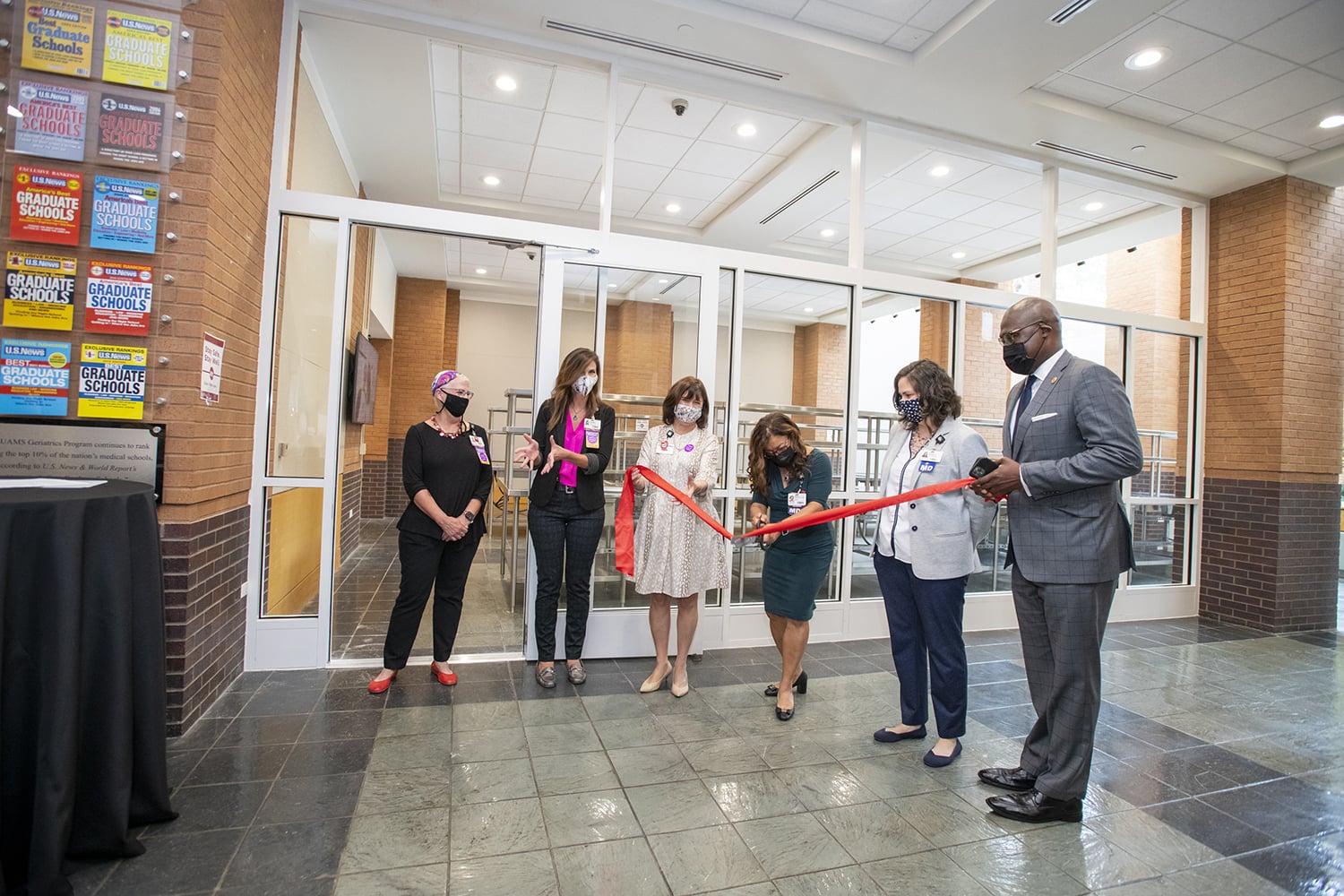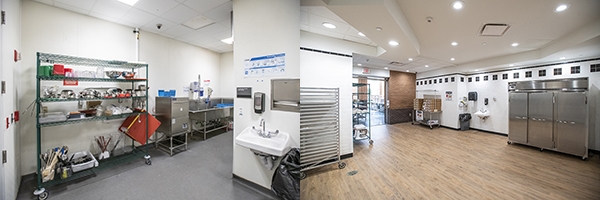View Larger Image

Little Rock Mayor Frank Scott Jr., far right, holds the ribbon as Gloria Richard-Davis, M.D., gets ready to cut it and officially open the the new Culinary Medicine Kitchen at UAMS.
Image by Bryan Clifton
Culinary Medicine Program Opens New Kitchen
| What used to be a space where people could eat lunch is now a place where people will make lunches and other meals as part of the UAMS Culinary Medicine Program.

UAMS Provost Stephanie Gardner, right, addresses the audience before the ribbon-cutting and formal opening of the Culinary Medicine Kitchen as Gloria Richard-Davis, left, listens.Image by Bryan Clifton
On Oct. 5, the program reached a milestone in its brief history as it formally opened its new Culinary Medicine Kitchen to teach and train faculty and students how to prepare healthy, toothsome meals. The kitchen occupies what was formerly a dining area on the first floor of the Donald W. Reynolds Institute on Aging.
Culinary medicine is a new evidence-based field in medicine that blends the art of food and cooking with the science of medicine. Culinary medicine’s goal is to help people make good personal medical decisions about accessing and eating high-quality meals that help prevent and manage chronic disease and restore well-being.
Using a temporary space provided by University of Arkansas-Pulaski Technical College, the program’s registered dietitian, Margaret Pauly and college of medicine faculties have provided instruction in culinary medicine to 213 students enrolled in one-night interprofessional simulation events or its eight-week courses meeting once per week for the past two years. The course has been open to senior medical students as an elective, and students from the College of Pharmacy and the Physician Assistant Studies program in the College of Health Professions have joined as well. The program has also offered limited employee and community courses with plans to expand.
In the newly renovated space, thanks to generous donors, the program will provide the convenience of on-campus Culinary Medicine Program classes.
“This on-campus teaching is more convenient for students, and we think participation will increase greatly when there isn’t a transportation issue to and from UA-Pulaski Tech,” said Stephanie Gardner, Pharm.D., Ed.D., provost and chief strategy officer. She added that UA-Pulaski Tech has been very accommodating and generous in its support.

Classes for teaching healthy cooking methods and nutrition will take place in this space in the kitchen.Image by Bryan Clifton
The curriculum of the program does not strictly teach a vegetarian lifestyle, but it does place an emphasis on a more heavily plant-based diet of fruits and vegetables, said Gloria Richard-Davis, M.D., the program’s director. The menu is a Mediterranean-based diet, which has been shown to contribute greatly to longevity and heart health, is even known to reverse some cardiovascular disease.
“The reality is we are a very unhealthy society,” Richard-Davis said. “We are trying to make a difference. Arkansas has some of the worst health and nutrition statistics of any state. This program was born out of a passion to teach our students about nutrition, how to prepare healthier meals and hopefully to change their lives. That they will in turn teach our patients another healthier way of life.”
With that in mind, Gina Drobena, M.D., read to the audience at the opening celebration a letter she received from a student who is now an intern in North Carolina. Drobena is the course director and also an associate professor in the UAMS College of Medicine Department of Pathology.
The student wrote: “I enjoyed the culinary medicine rotation at UAMS last year and want to include it in my practice long-term. I want to start a program here, but I am not sure where to start. Would you mind helping?”
Drobena said the letter is a great example of what the program seeks to accomplish in culinary medicine — students being inspired to take what they learn and use it to teach healthy nutrition and cooking to their patients and colleagues. In the near future, the program hopes to expand instruction to UAMS employees and communities of Arkansas, too, allowing members of the public to sign up for classes.
“I’m so excited about tonight,” Gardner said, gesturing toward the kitchen. “It’s a dream we’ve shared for a couple of years, and we’re eager to have you walk through and see the space where students, faculty, resident and community members will be able to learn more about nutrition and healthy eating.”
Using a curriculum created by Tim Harlan, M.D., at Tulane University’s Goldring Culinary Institute in New Orleans, the program delivers a comprehensive hands-on interactive course.
The program was started with Chancellor Patterson’s vision and support. The seed money for the program was a Chancellor’s Circle grant and it h
as received several nonprofit grants to support its community outreach programs from the American Cancer Society, Robert Wood Johnson, Arkansas Medical Foundation, Ardmore Institute of Health and recently another Chancellor’s Circle grant. In partnership with community organizations, UAMS will soon launch a program to increase chronic kidney disease awareness focused on decreasing prevalence in the African American community. The Culinary Medicine program also has worked closely with the Mexican Consulate to deliver community programs in Spanish.
Little Rock Mayor Frank Scott Jr. and Tonya Johnson, R.D., director of UAMS Nutrition and Hospitality Services, spoke briefly before a ceremonial ribbon-cutting. Johnson also handed out several healthy meal kits to guests to promote the new Fresh & Reddie service the university plans to roll out in January to all UAMS faculty, staff and students.
The Fresh & Reddie program will market inexpensive healthy meal kits with fresh ingredients and easy-to-prepare recipes, using the principles of culinary medicine.

The Culinary Medicine Kitchen also includes room for supplies, cleaning, refrigeration and food preparation.Image by Bryan Clifton